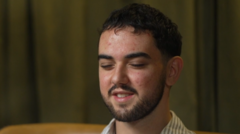After a stay at a Vang Vieng hostel notorious for serving free shots, Calum Macdonald went blind from methanol poisoning. As he copes with his new reality, he joins others in sounding the alarm on the dangers of unsafe alcohol consumption in popular tourist destinations.
Survivor of Methanol Poisoning Raises Alarm on Alcohol Safety

Survivor of Methanol Poisoning Raises Alarm on Alcohol Safety
Calum Macdonald, a young British man who lost his sight to methanol poisoning in Laos, shares his harrowing experience as he and the families of other victims advocate for awareness and safety.
Calum Macdonald's life took a tragic turn when he encountered a kaleidoscopic blinding light upon reaching the Vietnamese border after a night out in Laos. Just the day before, he and his friends had indulged in free whisky and vodka shots at a hostel in Vang Vieng. Initially dismissing his troubling vision as food poisoning, it became evident upon arriving at their hotel in Vietnam that something was gravely amiss—Calum was blind.
Now 23, Calum recounts his experience for the first time, revealing he was one of several individuals victimized in a mass methanol poisoning incident last November that sourced from the infamous Nana Backpacker Hostel. Six people tragically lost their lives, including two Danish women whom Calum had met during his stay. In light of his devastating experience, he is collaborating with the families of three other British individuals who succumbed to similar fates, urging the Foreign Office to clarify the risks travelers face regarding methanol poisonings on holiday.
Simone White's story echoes Calum's; she drank free shots just a day after he left Vang Vieng, blissfully unaware of the lurking danger. A text to her mother expressed her elation over the best vacation ever, moments before she was whisked into a coma in a Laos hospital. Despite immediate travel, her mother Sue received the heartbreaking news that Simone's condition had deteriorated dramatically, and ultimately, she passed away from methanol poisoning.
Methanol, a dangerous substance found in various products from household cleaners to fuels, can sneak into alcoholic beverages when distillation is careless. This prevalent issue in Southeast Asia leads to hundreds of poisonings annually, as outlined by the charity Doctors Without Borders (MSF). Early symptoms often resemble a hangover, complicating detection, yet severe consequences, including seizures and blindness, loom within hours of consumption.
Kirsty McKie, who lived in Bali, was another victim. Months before her death in 2022, she shared a drink with a friend, both struck by an inexplicable hangover that landed Kirsty in the hospital. Though her friend survived, Kirsty did not, highlighting the arbitrary nature of these tragedies.
The chilling tale of Cheznye Emmons, who died after consuming gin containing 66,000 times the legal methanol limit in Indonesia, resonates deeply with their families. Her mother Pamela recounted the last words Cheznye spoke—filled with fear mere moments before a seizure took her life.
In light of these tragedies, Calum advises tourists to avoid free drinks altogether, suggesting they stick to known brands, particularly local beers that are safe to enjoy. Determined to forge a positive outlook despite his blindness, Calum hopes to educate others about the life-threatening consequences of methanol consumption, feeling a responsibility to raise awareness as part of his newfound journey.
The Foreign Office has acknowledged methanol poisoning as a significant concern in certain regions and is coordinating efforts with local authorities to increase awareness among travelers. Calum and the bereaved families remain resolute in their fight for better information and safety, ensuring that their poignant stories spur change in travel practices.
















